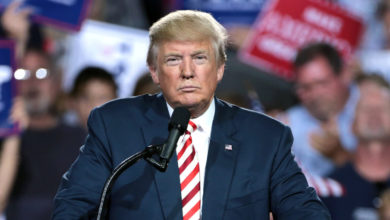In a landslide victory, Andrés Manuel López Obrador, or AMLO as he is popularly known, won Mexico’s presidential election, receiving 53 percent of the vote in what some are calling the most important election in the country’s history. His victory marks a significant change for Mexico and raises hopes that his government will break with the neo-liberal capitalist policies that have caused such devastation and suffering in recent decades.
AMLO’s is supported by the Together We Will Make History coalition, which includes his National Regeneration Movement (MORENA) along with the Labor Party and Social Encounter Party. This alliance also won a majority in the legislature. The election was a crushing defeat for the neo-liberal Institutional Revolutionary Party (PRI), which has governed Mexico for over 71 years and moved sharply to the right over time, as well as the conservative National Action Party (PAN). The runner-up to AMLO was PAN candidate Ricardo Anaya, who received only 22 percent of the vote.
Both the Mexican and U.S. capitalist class were bitterly opposed to Lopez Obrador’s campaign, fearing his win would spark the process of implementing progressive and anti-imperialist policies. Clueless and hypocritical liberals in the U.S. corporate media went as far as labeling Lopez Obrador as the “Mexican Donald Trump” on the basis of his “populism.” But it was clear to the Mexican people that the two candidates who ran against AMLO were loyal to the violent and corrupt political elite responsible—along with U.S. imperialism—for plunging Mexico into the social and political crisis it finds itself in.
Lopez Obrador is nothing like Trump. A political figure for most of his life, he has played an active role in transitioning the country away from one-party rule. As mayor of Mexico City, the world’s largest metropolis, his administration was effective in improving the local government’s efficiency, improving security, and stabilizing the city’s debt, leaving office with an 84 percent approval rating.
He nearly won both of his previous presidential campaigns in 2006 and 2012 on a progressive platform of denouncing government abuse and corruption, and putting the needs of the poor ahead of the rich. Many believe that those elections, especially in 2006, were stolen from AMLO through fraud.
A progressive campaign
His 2018 platform was no different. Lopez Obrador’s promises to the people of Mexico are an end to further privatization in the energy sector, increasing the minimum wage to levels that guarantee access to the basic basket of commodities, creating more jobs as well as supporting the establishment of a universal public health and education system. He also vowed to respect the San Andres Accords signed between the Zapatista Army of National Liberation and the Mexican government in 1996, which guarantees Indigenous peoples their right to control and manage their territories and resources including consultation on big infrastructure projects that could affect them. In Lopez Obrador’s victory speech, he identified corruption as the principal cause of inequality and the criminal violence that has plagued Mexico for years and said he would spare no one in his commitment to root it out.
For decades, Mexico has been governed by neo-liberal centrists and right-wingers who have been reliable partners in “free” trade and the so-called war on drugs that has led to large scale state violence and repression. Over the last decade, the conditions in Mexico have continuously worsened. In 2017, 25,000 murders took place in the country. Nearly half of its population lives in poverty, while the wealthiest 10 percent of the country’s population holds over 40 percent of the total income. The heavily militarized drug war has failed to prevent over 200,000 murders since 2006, despite spending $54 billion on security since 2007.
Lopez Obrador’s plan to combat the drug war is to rewrite the rules by suggesting a negotiated peace and amnesty for those in Mexico who had no choice but to join organized crime as a result of staggering inequality. The plan includes leniency for individuals who admit guilt, truth commissions to investigate crimes, and granting reparations for some victims.
Tensions with U.S. imperialism
Though Trump congratulated Lopez Obrador via Twitter on Sunday night, he has been openly antagonistic to Mexico over trade and migration since the start of his 2016 presidential campaign. The ongoing talks between the parties to the North American Free Trade Agreement are a direct result of Trump’s call for a renegotiation to better serve U.S. interests. Trump also continues reiterating one of his most controversial campaign promises: the building the border “wall” and having Mexico pay for it.
Various Mexican politicians have long said that Mexico will not pay for Trump’s proposed wall along the border. Shortly after Trump’s inauguration, López Obrador denounced the border wall. In his 2017 book called “Oye, Trump” (“Listen Up, Trump”), he declared, “Trump and his advisers speak of the Mexicans the way Hitler and the Nazis referred to the Jews, just before undertaking the infamous persecution and the abominable extermination.”
However, as his campaign continued he has offered calls for mutual respect with Trump. After the two shared a phone call the day after the election, Lopez Obrador went to Twitter to say he had proposed a comprehensive deal to Trump. Lopez Obrador said he was hopeful that the deal will create jobs, lower immigration, and improve security as an alternative to Trump’s border wall.
Many expect Lopez Obrador to guide the reorientation of Mexican economic and foreign policy in a nationalist direction. This is distinct from a socialist reorganization of society, which would put the Mexican working class and peasants in control of the economy and the government. However, to the extent that Obrador is able to free Mexico from the framework of anti-worker domestic policies and subservience to U.S. corporations, his election can be considered a major step forward for the oppressed masses of the country.
Lopez Obrador’s win marks an important development for progressives in Mexico and the world over. Especially in Latin America, AMLO’s victory provides a much-needed injection of energy for the continent’s left after a push by regional elites and the U.S. government succeeded in installing right-wing government in many countries in recent years. With a new government elected on the basis of progressive campaign pledges, the courageous mass movements of Mexico’s poor and oppressed have a major opportunity to press their fight for justice.






